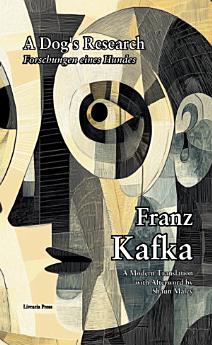A Dog's Research
The Complete Works of Franz Kafka പുസ്തകം, 26 · Continental Press
ഇ-ബുക്ക്
128
പേജുകൾ
family_home
യോഗ്യതയുണ്ട്
info
reportറേറ്റിംഗുകളും റിവ്യൂകളും പരിശോധിച്ചുറപ്പിച്ചതല്ല കൂടുതലറിയുക
ഈ ഇ-ബുക്കിനെക്കുറിച്ച്
This has been translated as "Investigations of a Dog" or "Researches of a Dog" and other variations. The original German title was "Forschungen eines Hundes". In the narrative tradition of Voltaire in works such as "Micromégas" (1752), Kafka's story is narrated by a dog who reflects on his life and engages in an obsessive investigation of the mysterious forces governing his world, particularly focusing on the nature of sustenance and survival. The dog questions why food appears as if by magic and struggles to comprehend the rituals and behaviors of other dogs. His inquiries, however, are fraught with frustration, as he is unable to find satisfactory answers, leading to an ongoing sense of existential confusion. "A Dog's Research" can be read as a satirical and philosophical commentary on the limits of human understanding and the search for meaning, just like Voltaire's comedic-philosophic works. The dogs futile quest for knowledge mirrors the human condition, where ultimate truths often remain elusive despite relentless effort. The storys tone, blending humor with melancholy, underscores the tension between curiosity and the inherent limitations of perception. Kafkas use of the dog as a narrator allows him to examine human behaviors and social structures from an outsiders perspective, making this story a profound meditation on existence and the pursuit of knowledge.
രചയിതാവിനെ കുറിച്ച്
A Bohemian novelist and short-story writer, Kafka's work, which fuses elements of realism and the fantastic, typically features isolated protagonists facing bizarre or surrealistic predicaments and incomprehensible socio-bureaucratic powers. His writings, such as "The Metamorphosis" and "The Trial," explore themes of alienation, existential anxiety, and guilt, and are influential in modernist literature.
ഈ ഇ-ബുക്ക് റേറ്റ് ചെയ്യുക
നിങ്ങളുടെ അഭിപ്രായം ഞങ്ങളെ അറിയിക്കുക.
വായനാ വിവരങ്ങൾ
സ്മാർട്ട്ഫോണുകളും ടാബ്ലെറ്റുകളും
Android, iPad/iPhone എന്നിവയ്ക്കായി Google Play ബുക്സ് ആപ്പ് ഇൻസ്റ്റാൾ ചെയ്യുക. ഇത് നിങ്ങളുടെ അക്കൗണ്ടുമായി സ്വയമേവ സമന്വയിപ്പിക്കപ്പെടുകയും, എവിടെ ആയിരുന്നാലും ഓൺലൈനിൽ അല്ലെങ്കിൽ ഓഫ്ലൈനിൽ വായിക്കാൻ നിങ്ങളെ അനുവദിക്കുകയും ചെയ്യുന്നു.
ലാപ്ടോപ്പുകളും കമ്പ്യൂട്ടറുകളും
Google Play-യിൽ നിന്ന് വാങ്ങിയിട്ടുള്ള ഓഡിയോ ബുക്കുകൾ കമ്പ്യൂട്ടറിന്റെ വെബ് ബ്രൗസർ ഉപയോഗിച്ചുകൊണ്ട് വായിക്കാവുന്നതാണ്.
ഇ-റീഡറുകളും മറ്റ് ഉപകരണങ്ങളും
Kobo ഇ-റീഡറുകൾ പോലുള്ള ഇ-ഇങ്ക് ഉപകരണങ്ങളിൽ വായിക്കാൻ ഒരു ഫയൽ ഡൗൺലോഡ് ചെയ്ത് അത് നിങ്ങളുടെ ഉപകരണത്തിലേക്ക് കൈമാറേണ്ടതുണ്ട്. പിന്തുണയുള്ള ഇ-റീഡറുകളിലേക്ക് ഫയലുകൾ കൈമാറാൻ, സഹായ കേന്ദ്രത്തിലുള്ള വിശദമായ നിർദ്ദേശങ്ങൾ ഫോളോ ചെയ്യുക.











